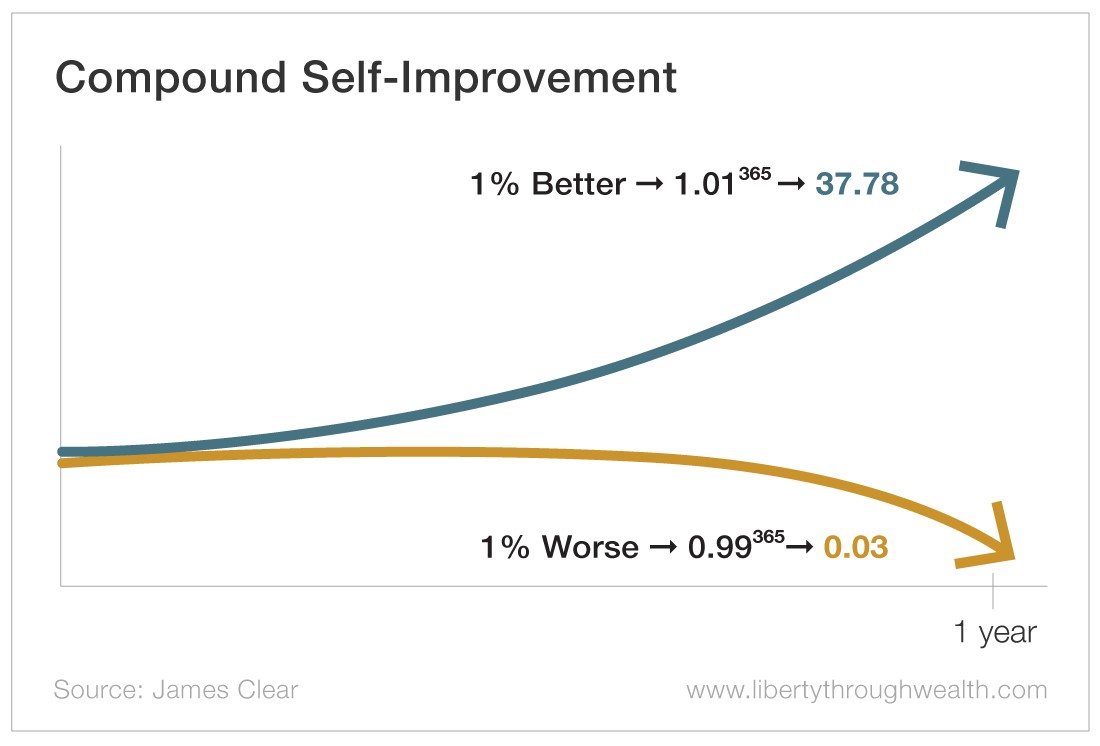- Whether it’s making money, gaining knowledge or staying healthy, harnessing the power of compounding comes down to one thing: adopting the right habits.
- Think of habits as the “compound interest of self-improvement.”
My colleague Alexander Green has written often about how, by saving and investing in the stock market, every American can become a millionaire over time.
This may seem hard to believe. The secret?
Discipline… combined with the power of compound interest. Save a little regularly today, and reap the surprisingly large rewards tomorrow.
Truth be told, the power of compounding is hard for us to get our heads around. And we all prefer the excitement of a quick, easy and hugely profitable stock market bet.
But here’s the reality… If you get rich, it will most likely be through the miracle of compound interest.
So here’s a novel thought: What if the principle of compounding didn’t apply only to money? What if you could use the same powerful principle to improve other areas of your life – not only money but also knowledge, health and relationships?
You only need to adopt the right habits.
Let me explain…
The Remarkable Power of Compounding
Albert Einstein once called compound interest “the eighth wonder of the world.”
Now, you don’t have to be an Einstein to understand the mathematics of compounding. Still, its real-world implications are hard to feel in your gut.
I bet you’d be shocked to learn that folding a piece of paper in half 42 times would make it tall enough to reach the moon.
And that if you doubled the number of grains of rice on each square of a chessboard, by the 64th square you’d have more than 18 quintillion grains of rice. That equals about 210 billion tons.
Few investors understand compound interest better than Warren Buffett.
Yes, he has trailed the U.S. stock market over the past 15 years. But the power of compounding for the first 40 years of his career was enough to turn him into the world’s most successful investor.
In fact, Buffett made 99.7% of his fortune after his 52nd birthday.
Battling Human Nature
Human nature conspires against us when it comes to benefiting from compounding.
All of us can save and invest money, but many of us don’t.
All of us can build our knowledge, but many of us don’t put in the effort.
All of us can adopt healthy habits, but many of us fail to do so.
Most of us succumb to the temptation of instant gratification.
Saving a little money right now won’t make you a millionaire tomorrow. But starting today will make it more likely that you’ll become a millionaire in the future.
Reading a book won’t make you smart overnight. But reading one today will improve your odds of becoming an expert in the future.
Adopting healthy eating habits won’t turn you into a picture of health in the next 24 hours. But eating well over time may ensure your future well-being.
Compounding the Power of Habit
Whether it’s making money, gaining knowledge or staying healthy, harnessing the power of compounding comes down to one thing: adopting the right habits.
Think of habits as the “compound interest of self-improvement.” The same way that money multiplies through compound interest, the effects of your habits multiply over time.
Tiny habits – good or bad – make little difference on any given day.
Only when you look back two, five or 10 years later does the value of good habits – and the cost of bad ones – stare you in the face.
Author James Clear calls these “atomic habits.” They are each a tiny change, a marginal gain, a 1% improvement. The difference is so slight that you may not even notice it.
Let’s say you commit to becoming 1% better at a specific task every day for a single year. The implications of this small increase in commitment are enormous.
Here’s how Clear illustrates the long-term impact of these slight shifts in direction.

If you can get 1% better each day, the blue arrow confirms you’ll end up almost 38 times better by the end of the year.
But let’s not ignore the more sobering lesson of the yellow arrow: Compounding also works in reverse. If you get 1% worse each day for one year, you’ll decline nearly down to zero. When we repeat small errors day after day, our poor choices compound into toxic results.
The lesson is clear: Compounding reinforces what’s already happening – whether good or bad. Over time, tiny daily habits make an astonishing difference.
So make sure you develop the right habits both in your finances and the other areas of your life.
It will make all the difference.
Good investing,
Nicholas
P.S. Clear’s book, Atomic Habits: An Easy & Proven Way to Build Good Habits & Break Bad Ones, is chock-full of entertaining stories that confirm the importance of having the right habits.
Interested in hearing more from Nicholas? Follow @NickVardy on Twitter.
